Front row, L to R: Sen. Matt Boehnke, R-Kennewick, Gov. Bob Ferguson, and Virginia Hall, SLA, Office of Sen. Boehnke. Back row, L to R: Dawn Boehnke, Derrek Wilson, Dept. of Ecology, Anthony “Tony” Abbot, Dept. of Ecology, Cameron Long, SRC Policy, WA State Senate, Ken Camp, Dept. of Ecology, Micheal Leone, Session Intern, Office of Sen. Boehnke, and Christina McNair, Session Aide, Office of Sen. Boehnke/Credit: Washington State Senate
OLYMPIA… Friday, the governor signed legislation sponsored by Sen. Matt Boehnke that strengthens Washington’s climate accountability by transitioning the state to annual reporting of greenhouse-gas emissions.
“This law is about accountability, transparency, and making sure we’re using real data, not guesswork, when making decisions about Washington’s energy and environmental policies,” said Boehnke, R-Kennewick. “Good data equals better decisions. We can’t fix what we don’t measure. By getting annual updates, the Legislature and the public will have better tools to evaluate whether we’re on track or need to change course.”
The state reports its total greenhouse gas (GHG) emissions every two years. The law created by Boehnke’s bill requires the Department of Ecology and the Department of Commerce to publish an annual inventory of statewide emissions, starting in 2031. It also directs the agencies to provide interim updates in 2027 and 2029 to improve visibility as the state moves toward its 2030 climate targets.
““Climate policy should be based on facts and outcomes, not politics or assumptions,” Boehnke added. “Regardless of ideology, we all benefit from better data and a clear-eyed look at whether our policies are delivering results.”
His SB 5036, which was passed by the Legislature unanimously , builds on Washington’s existing climate laws—like the Climate Commitment Act—by ensuring consistent public reporting on the effectiveness of those programs. The new law also ensures that natural-gas utilities continue to report annual emissions data as part of their participation in the state’s cap-and-tax program.
“This is a smart, responsible step forward that reflects the kind of bipartisan, data-driven work we need more of in Olympia,” Boehnke said.
The new law takes effect July 27.
###












